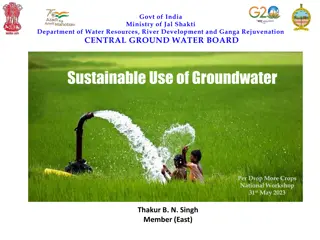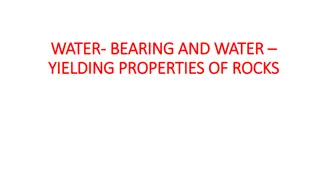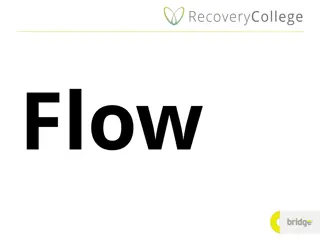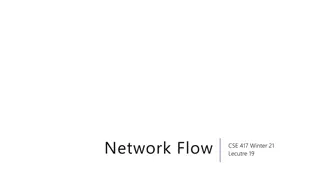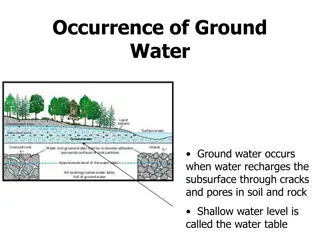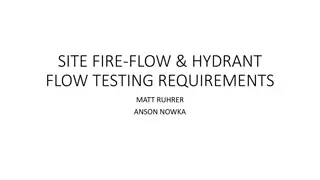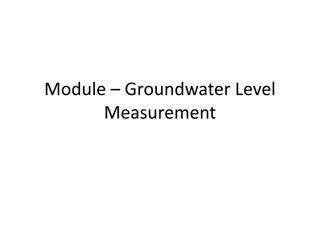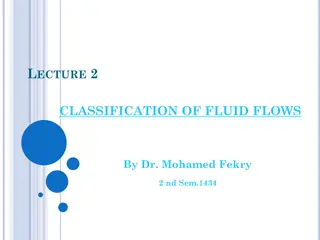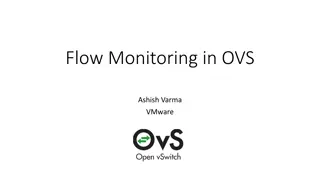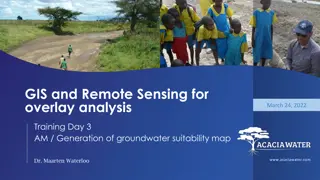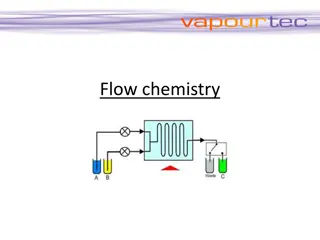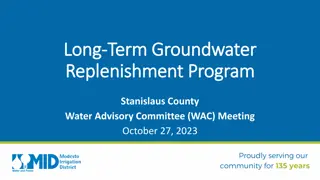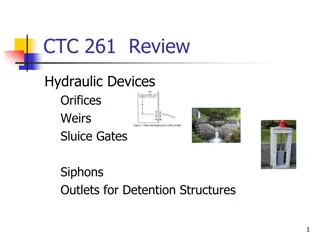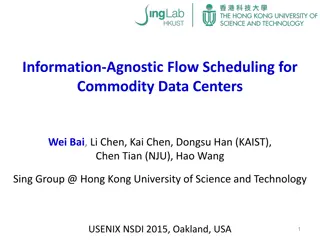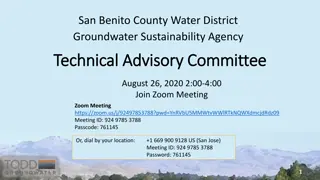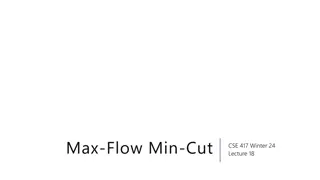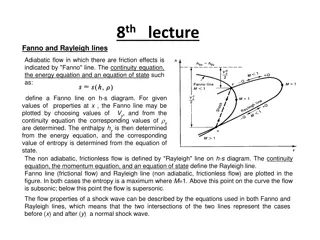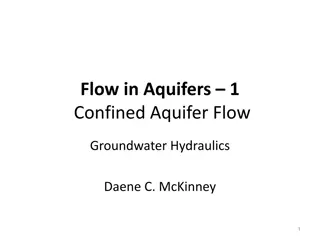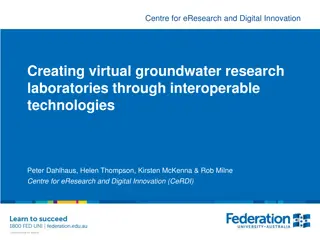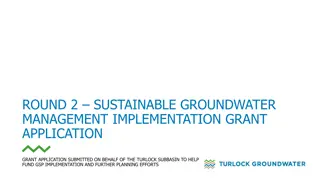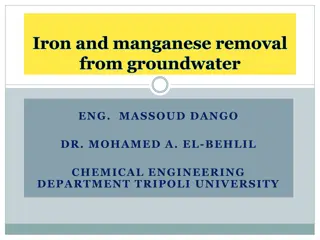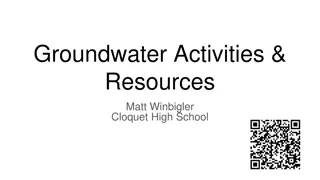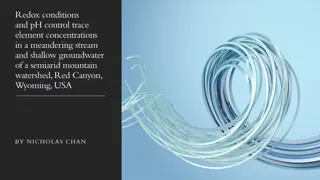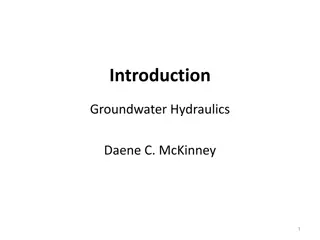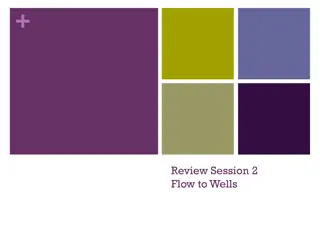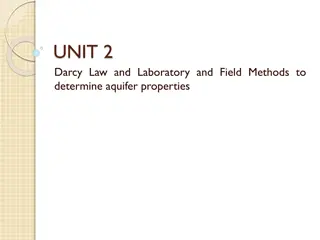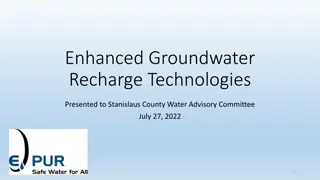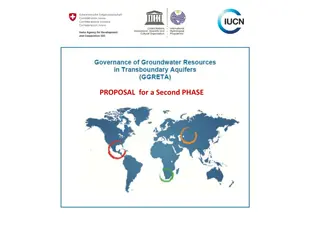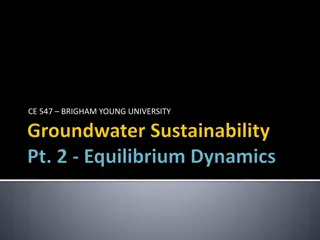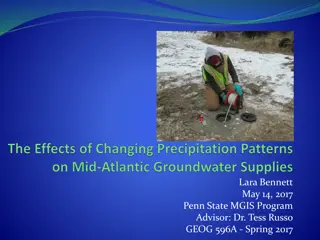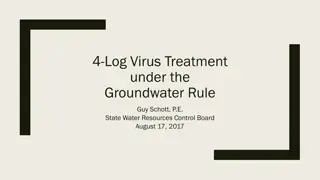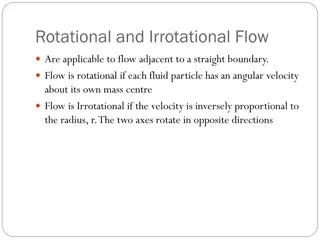Sustainable Use of Groundwater
Groundwater management and sustainable use are crucial in India, as highlighted by the Ministry of Jal Shakti. The country faces challenges such as declining groundwater levels, quality deterioration, and increasing demand-supply gaps. Effective strategies and responsible practices are needed to add
0 views • 20 slides
Groundwater Recharge Station Project
The Groundwater Recharge Station Project, Project Number 21-381, at California State University, Stanislaus involves the construction of a groundwater recharge station. The notice to contractors provides details on bid proposals, project scope, budget estimate, project duration, and prequalification
0 views • 19 slides
Microplastic Occurrence in South Korean Groundwater by Well Depth and Hydrogeology
The study conducted by Kangwon National University in South Korea analyzed microplastic occurrence in groundwater from wells of varying depths and hydrogeological settings. Samples were collected from the National Groundwater Monitoring Network pipes in Gapyeong and Chuncheon. Water type analysis re
7 views • 6 slides
Understanding the Water Bearing and Yielding Properties of Rocks
This informative content delves into the significance of porosity and permeability in rock formations, detailing primary and secondary porosity types, factors influencing porosity, and the concept of Darcy's Law governing groundwater flow. It emphasizes the relationship between effective porosity, r
1 views • 13 slides
The Psychology of Flow: Achieving Total Focus and Optimal Performance
Engage in activities for their intrinsic value, where the ego diminishes, and time seems to vanish - that's when flow occurs. This optimal psychological state involves deep concentration, clear goals, and a sense of control. By embracing challenges and staying in the present moment, one can cultivat
0 views • 13 slides
Understanding Runoff in Hydrology
Runoff in hydrology refers to surface water flow from precipitation and other sources in drainage basins. It plays a crucial role in stream flow and peak flood formation, influenced by factors like overland flow, interflow, and groundwater flow. This article explores the sources of runoff, including
3 views • 27 slides
Understanding Max Flow in Network Theory
In network theory, understanding the concept of maximum flow is crucial. From finding paths to pushing flow along edges, every step contributes to maximizing the flow from a source to a target in the graph. The process involves determining capacities, creating flows, and calculating the net flow ent
2 views • 41 slides
Understanding Groundwater: Occurrence, Recharge, and Movement
Groundwater occurs when water seeps into the subsurface through cracks and pores in rocks and soil, forming the water table. Recharge happens naturally through processes like precipitation and snowmelt, as well as artificially through methods like recharge wells and water spread over land. The movem
0 views • 8 slides
Fire Flow Requirements and Calculation Methods
Detailed information on site fire flow and hydrant flow testing requirements, how to calculate required fire flow, applicable codes and standards including NFPA and IBC, duration of fire flow, methodologies for fire flow calculation, and ISO methods and formulas.
4 views • 30 slides
Understanding Groundwater Level Measurement Technologies
Groundwater levels are commonly measured using submersible pressure transducers, with data loggers used for monitoring and recording. Different options such as vented vs. non-vented systems, battery voltage considerations, and specifications for pressure sensors are discussed. Additional equipment l
0 views • 12 slides
Importance of Cash Flow Analysis in Financial Management
Cash flow analysis is a crucial financial tool for effective cash management, aiding in evaluating financial policies and positions. It helps in planning, coordinating financial operations, assessing cash needs, and meeting obligations. However, it has limitations as it does not substitute the incom
1 views • 7 slides
Understanding Fluid Flows in Fluid Mechanics
Fluid Mechanics is the study of fluids in motion or at rest, and their interactions with solids or other fluids. Fluid flows are classified based on various characteristics such as viscous versus inviscid regions, internal versus external flow, compressible versus incompressible flow, laminar versus
1 views • 16 slides
Understanding Flow Monitoring in OVS for Efficient Network Management
Learn how Flow Monitoring in Open vSwitch (OVS) allows controllers to track and manage changes to flow tables, enabling efficient network management. Explore topics such as Flow Mod programming, Flow Monitor messages, OVS support, monitoring vs. snoop, and practical examples of flow monitoring in ac
0 views • 9 slides
Groundwater Suitability Mapping Training Overview
The training program focuses on GIS and Remote Sensing for overlay analysis, with an emphasis on generating groundwater suitability maps. Dr. Maarten Waterloo leads the session, covering topics like data processing, automation, and sensitivity analysis. The program includes hands-on activities and e
0 views • 14 slides
Impact of Road Deicing Salts on Water Quality in Upper Passaic River Basin
An in-depth geochemical analysis conducted by Dr. Michael A. Turner and Dr. Duke U. Ophori studied the impact of road deicing salts on groundwater quality in the Upper Passaic River Basin, New Jersey. The study focused on major ions in groundwater, statistical analysis of ion concentrations, correla
0 views • 19 slides
Understanding Flow Chemistry for Efficient Chemical Reactions
Flow chemistry, also known as continuous flow or plug flow chemistry, revolutionizes chemical reactions by running them in a continuous flow stream. This dynamic process offers efficient manufacturing of chemical products with precise control over critical parameters like stoichiometry, mixing, temp
2 views • 7 slides
Sustainable Groundwater Management in Stanislaus County: A Comprehensive Overview
Long-term groundwater replenishment programs, pumping policies, and the Sustainable Groundwater Management Act (SGMA) are crucial for managing water resources in Stanislaus County. The Modesto Irrigation District's (MID) efforts in conjunctive use, groundwater recharge projects, and public outreach
2 views • 10 slides
Understanding the Importance of Soil and Groundwater Measurements
Explore the significance of infiltration and hydraulic conductivity measurements in environmental studies, training sessions offered by Eijkelkamp Training & Consultancy, and various reasons for conducting measurements such as defining drain distance, disconnecting rainwater, soil and groundwater po
0 views • 55 slides
Understanding Open Channel Flow and Mannings Equation
This review covers hydraulic devices such as orifices, weirs, sluice gates, siphons, and outlets for detention structures. It focuses on open channel flow, including uniform flow and varied flow, and explains how to use Mannings equation for calculations related to water depth, flow area, and veloci
1 views • 43 slides
Information-Agnostic Flow Scheduling: Minimizing FCT in Data Centers
This study explores information-agnostic flow scheduling for commodity data centers to minimize flow completion time (FCT) without prior knowledge of flow size. Existing solutions requiring prior flow size information are deemed infeasible for some applications and challenging to deploy in practice.
1 views • 46 slides
San Benito County Water District Groundwater Sustainability Agency Technical Advisory Committee Meeting Summary
The San Benito County Water District Groundwater Sustainability Agency Technical Advisory Committee met on August 26, 2020, to discuss various topics including update on GSP schedule, setting sustainability criteria, and monitoring for subsidence issues. The meeting highlighted the need for more sys
0 views • 33 slides
Understanding Max-Flow and Min-Cut Problems in Graph Theory
This collection covers the concepts of max-flow and min-cut in directed graphs, focusing on moving water or data packets from a source to a target vertex within given capacities. It explains flow values, finding optimal solutions, and strategies for maximizing flow networks. The visuals aid in grasp
0 views • 58 slides
Understanding Fanno and Rayleigh Lines in Adiabatic Flow
Fanno and Rayleigh lines on the h-s diagram help in analyzing adiabatic flow with friction effects. The Fanno line represents frictional flow, while the Rayleigh line signifies non-adiabatic, frictionless flow. These lines aid in plotting flow properties and understanding phenomena like shock waves
0 views • 6 slides
Understanding Groundwater Flow in Aquifers
Groundwater flow in aquifers, whether confined or leaky, involves complex concepts like aquifer transmissivity, storativity, conductivity, Darcy's law, and continuity equations. Focusing on horizontal flow approximation and utilizing formulas for transmissivity and conductivity allows us to study th
0 views • 15 slides
Virtual Groundwater Research Lab Solutions
CeRDI from the Centre for eResearch and Digital Innovation focuses on creating virtual groundwater research laboratories using interoperable technologies. They address challenges such as providing access to complex data, incorporating qualitative and quantitative data into models accurately, harness
0 views • 21 slides
Sustainable Groundwater Management Grant Applications Update
An update on the Round 2 Sustainable Groundwater Management Grants, including details on the grant application process, funding availability, application submissions, and project components. The applications are part of efforts to support sustainable groundwater management in the Turlock Subbasin an
0 views • 6 slides
Iron and Manganese Removal from Groundwater Study
Iron and manganese are common natural elements in groundwater, but their presence can lead to various issues such as metallic taste, staining of clothes and fixtures, and growth of iron bacteria. This study aims to analyze groundwater wells in Libya, identify high levels of iron and manganese, and p
0 views • 29 slides
Enhancing Flow Opportunities in Scott Valley Groundwater Study
The Scott Valley Groundwater Study identifies flow enhancement opportunities to improve water management and increase stream flows. Initiatives include developing an integrated hydrologic model, exploring water management strategies, and implementing groundwater recharge projects since 2008. The stu
0 views • 6 slides
Human Impacts on Groundwater Systems in Minnesota: A Study of Interactions and Solutions
Explore the intricate relationships between human activities and groundwater systems in Minnesota through investigations, models, and technological solutions. Utilize place-based evidence, including insights from Minnesota American Indian tribes and cultures, to understand and address climate change
0 views • 7 slides
Redox Conditions and pH Control in a Mountain Watershed: Study in Red Canyon, Wyoming, USA
Exploring redox conditions and trace element concentrations in a semi-arid mountain watershed, this study in Red Canyon, Wyoming, delves into the impact of oxic surface water and anoxic groundwater on trace element cycling. The investigation aims to enhance understanding of seasonal variabilities, f
0 views • 11 slides
Understanding Groundwater Hydraulics and Hydrology
Explore the fundamentals of groundwater hydraulics and hydrology in this course, covering topics such as Darcy's law, aquifer testing, unsaturated flow, and more. Dive into practical applications and participate in a team project focusing on limiting hydraulic containment of contaminated aquifers. G
0 views • 25 slides
Groundwater Flow: Assumptions, Solutions, and Tests
Explore basic assumptions, solutions, and tests related to groundwater flow in aquifers, including confined and unconfined scenarios. Learn concepts such as Thiem solution, Theis solution, and data analysis from pumping tests.
0 views • 17 slides
Understanding Darcy Law and Methods for Aquifer Property Evaluation
Darcy Law, introduced by Henry Darcy, defines the relationship between flow rate, head loss, cross-sectional area, and flow path length in porous media like aquifers. By conducting experiments and measuring hydraulic conductivity, Darcy Law allows estimation of groundwater velocity and flow characte
0 views • 49 slides
Enhanced Groundwater Recharge Technologies Overview
This presentation on Enhanced Groundwater Recharge Technologies covers a range of topics including background information, local assessments, groundwater recharge zones, and opportunities in Stanislaus County. It delves into various methods such as drywells, spreading basins, and aquifer storage, as
0 views • 9 slides
Enhancing Groundwater Governance and Cooperation in Phase 2 of GGRETA Project
The proposed Phase 2 of the GGRETA Project aims to improve groundwater governance, develop gender-responsive water approaches, and enhance cooperation on water security in countries like El Salvador, Honduras, South Africa, and others. The objectives include improving resource knowledge, fostering c
0 views • 5 slides
Understanding Groundwater Hydrology Concepts at Brigham Young University
Explore the derivation of transient terms, specific storage mechanisms, and distinctions between specific storage, storativity, and specific yield in groundwater hydrology. Delve into the mathematical equations governing groundwater flow and storage, understanding the change in mass stored in the sy
0 views • 17 slides
Understanding Groundwater Sustainability and Equilibrium Dynamics
This content delves into the concepts of groundwater sustainability, equilibrium, and capture in relation to groundwater management. It explores transitional storage, groundwater mining, and debunks the water budget myth. The images and explanations illustrate how pumping affects aquifers, the evolu
0 views • 11 slides
Exploring the Critical Relationship Between Climate and Groundwater
Investigating groundwater as a vital global resource, this study delves into the profound impact of climate change on groundwater levels and quality. Highlighting challenges and solutions, it emphasizes the urgent need for sustainable groundwater management practices.
0 views • 21 slides
Understanding 4-Log Virus Treatment and Groundwater Rule Compliance
This collection of images and information delves into the importance of 4-log virus treatment under the Groundwater Rule, regulatory requirements for groundwater systems, the basics of Ct calculations for disinfection, types of disinfectants used, and understanding log inactivation of viruses. The c
0 views • 24 slides
Understanding Fluid Flow and Measurement Devices
The concept of rotational and irrotational flow adjacent to a straight boundary, along with the dynamics of fluid flows and laws governing fluid flow like the continuity equation and energy equation, are discussed. Insights into devices for flow measurement such as venturimeter, pitot tube, orifices
0 views • 4 slides
